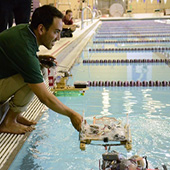Engineers for a Sustainable World host national Summit on Sustainability
 Northwestern hosts over a dozen sustainability and energy related conferences and events but Engineers for a Sustainable World’s (ESW) NU Summit on Sustainability (NUSOS) is one of the largest, bringing in thought leaders in energy, waste, resource management, and more. The fourth annual summit sought to inspire the NU community to think about sustainable solutions by focusing on the theme “Innovation.”
Northwestern hosts over a dozen sustainability and energy related conferences and events but Engineers for a Sustainable World’s (ESW) NU Summit on Sustainability (NUSOS) is one of the largest, bringing in thought leaders in energy, waste, resource management, and more. The fourth annual summit sought to inspire the NU community to think about sustainable solutions by focusing on the theme “Innovation.”
Partnering for the first time with Engineers for a Sustainable World (ESW) National for a three-day conference, more than 170 student leaders from ESW chapters across the country joined NU students, faculty, and staff members at the summit. This made NUSOS 2014 the largest and longest summit thus far with two full days of talks from practitioners, thought leaders, and community organizers on how to invent and re-create processes that currently harm the environment.
Friday morning’s keynote speaker Jill Boughton, affectionately known as the “Queen of Waste” took the audience on a journey through her career at Procter and Gamble to starting her new company W2Worth. W2Worth dissects and re-thinks the waste disposal system in developing countries to raise public health and economic viability, while reducing the environmental impact of trash. Boughton inspired and challenged attendees, proclaiming, “If it isn’t audacious, its probably not worth doing. We as innovators have to ask, does it have to be that way?”
Six panels followed and attendees learned about energy, economics, higher education, materials science, policy, and agriculture from speakers who included: the Chief Sustainability Officer of the City of Chicago, an NU professor who talked about inner-city communities and eco-rap, and a researcher at Argonne National Labs. Pura Playa Co-Project Manager, Danielle Faden, said she got a lot of out the policy panel and stated, “I felt Professor Sarah McFarland Taylor did a great job bringing up that the current mainstream environmental movement is focused on the advantaged paying off problems, but should be more inclusive and concentrate on human health.”
Friday’s closing keynote had close to 250 attendees to hear the Director of Sustainable Programs at Dow Chemical and NU alum, Mark Weick, talk about how Dow uses environmental goals to drive its economic and strategic planning. He discussed Dow's history of energy considerations; most notably, Dow's early bromine extraction process which required a large amount of energy, prompting engineers to design a cogeneration plant to generate the power and steam necessary for the process.
The overarching theme of Weick's presentation was how Dow uses sustainability metrics and life cycle assessments to translate social benefits to business benefits. For example, Dow's 2005 Sustainability goals, written in 1994, cost the company $1 billion and saved $5 billion throughout the decade. Weick also showcased Dow's packaging innovations that reduce waste and prolong food shelf life. Weick closed the talk by emphasizing the importance of collaboration between citizens, industry, academia, government, and non-governmental organizations (NGOs) to create and implement a blueprint that will successfully create a sustainable world. Working with organizations like Dow is critical to NU’s goals of being a leader in sustainability, said Director of Sustainability at Northwestern, Rob Whittier. “Dow is a leader in this space and we’re going to look to grow our partnership in our research and in the classroom, though fellowships and recruiting, and by leveraging their expertise in developing and implementing our own initiatives.”
On Saturday, the ESW National conference continued with a series of workshops, presentations, and networking sessions that ranged from leadership training to career advice. ESW member, Emily Northard, enjoyed University of Texas at Austin’s ESW chapter project, titled “Longhorn Lights Out,” where every Friday 50 - 100 volunteers would walk through buildings on campus and manually turn off the lights. They also created an app, making it easy for volunteers to track which lights were turned off over the weekend to calculate energy savings. The afternoon also featured an inter-chapter challenge at Henry Crown Sports Pavilion pool, where chapters raced 100 percent sustainably powered boats they had built.
The day culminated in a banquet and talk from the Executive Director of the Spence Farm Foundation, Erin Meyer, who spoke about sustainable food systems. ESW member, Nora Richter was really impressed with the Spence Farm Foundation’s work with chefs, bringing them a farm to educate them on the orgin of the produce and meat they serve.
“Again and again I’m impressed by the ESW’s ability to pull together these events and this year they had a chance to show off to their peers from some of the country’s top engineering programs,”added Whittier.
For updates about next year’s conference, please email Katherine Gladstone.